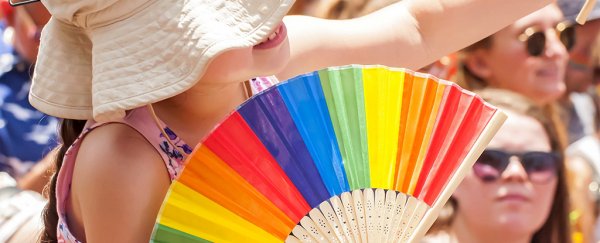In a world where marriage between individuals of the same sex is increasingly recognised in law, opponents desperately cling to the belief that children raised by gay couples fare worse when deprived of a parent of either gender.
The bulk of research just doesn't back this up. And there is a lot of research out there. Yet the debate persists, so this latest study digs a little deeper into the problem in an effort to clear up persisting arguments.
Like so much in sociology, the topic of child welfare and same-sex parenting is incredibly complex. Sample sizes are often small, and large-scale census surveys have only recently begun to collect information explicitly detailing sexual orientation.
Some researchers have been critical of the rigour behind the studies, leaving room for ongoing debate.
And while the vast majority of studies on the topic of children's emotional and psychological wellbeing in same-sex households don't tend to identify any negative impacts, there are rare exceptions.
One 2014 analysis on the wellbeing of over 200,000 children in the US found emotional problems were at least twice as prevalent among kids of same sex parents, although they ultimately pointed the finger at the biological relationship between offspring and their guardians more than the parent's genders.
Now a team of researchers have dug into the data from the 2013 to 2015 US National Health Interview Survey, compiling information on the emotional and mental health difficulties of more than 21,000 children aged 4 to 17.
Recent changes to the way information is collected in the survey have meant this new study could take into account each adult's sexual orientation – something which could only be surmised previously based on the parent's genders.
While the study failed to show any indication of increased emotional or psychological difficulties among children of homosexual parents, they did happen to find those with bisexual parents had slightly poorer questionnaire scores.
A likely cause soon became clear. Once the researchers took into account the parent's level of psychological distress, the differences vanished.
In other words, any potential variation in the children's mental wellbeing was probably a result of the challenges the parents face in a society that stigmatises their sexual orientation and non-traditional relationships, and not as a direct consequence of their sexualities.
"As lesbian, gay, and bisexual parented families become more visible, the findings bolster previous studies revealing that children raised in these families have comparable psychological well-being compared with children raised by heterosexual parents," says researcher Jerel Calzo of the San Diego State University Graduate School of Public Health.
"In addition, the results indicate the need for continued investment in strategies to prevent sexual orientation-based discrimination and to support sexual minority parents who may experience minority stress."
The study is an important one, not just in providing even more evidence refuting concerns that we must 'think of the children!', but in suggesting that negative consequences are more likely to be the result of the stigma itself.
No doubt this won't be the final word on the matter as pools of social data continue to grow and public debate continues to boil.
The take home message for now? A society that is truly worried about the welfare of children in diverse families should become more inclusive, not less.
This research was published in Child Development.
